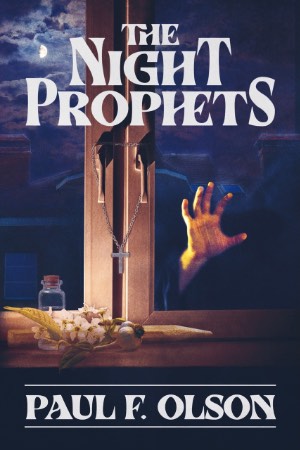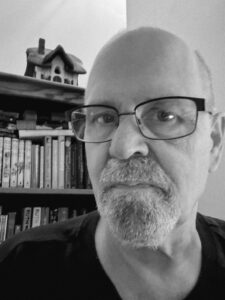
An Interview with Paul F. Olson
Despite Cemetery Dance’s hot-off-the-press trade paper and e-book editions of his 1989 novel The Night Prophets, it took a bit of coaxing to get author Paul F. Olson to agree to an interview. Paul, like many writers, is self-effacing and a trifle leery of the spotlight. He is justifiably proud of his brilliant novella “Bloodybones” having been nominated for the 2017 World Fantasy Award. But in general, this rather quiet Midwesterner doesn’t sound his own trumpet. He obligingly answered my questions, and I am most grateful. For more about Paul and his writing, visit his website: https://paulfolson.com
How would you distill the plot of The Night Prophets in twenty-five words or less?
Starting with the easy questions, I see. Hmm. Okay. How about this?
Friends uncover evil at the heart of a vast international religious movement and must do battle for their lives and souls.
Did you write the novel as sheer entertainment or is there a subtext?

I definitely wrote the novel as entertainment – that’s always my top priority. There’s story, intrigue, action, a large cast of characters, advances, setbacks, triumphs, tragedy, and my first hope, my first goal, is that all of that is entertaining for the reader. But it would be disingenuous to say there is no subtext. In the case of The Night Prophets, I didn’t even have to add the subtext to the plot. I didn’t have to layer it into the story or pull any of the usual writerly tricks to gradually unveil it to the reader. It’s inherent in the setting, the background, the very core of the book and everything that happens in it.
Vampire mania has somewhat dissipated. Do you have a sense of when the sanguinary creatures will bite back bigtime in the bookstores?
Unfortunately, my crystal ball was broken during a move back in 1995, so the best I could do would be to take a wild stab in the dark. The short answer, though, is no. I don’t know when vampire fiction will rise again. But I do know it will. Since The Night Prophets was first published in 1989, there have been at least two huge vampire booms, and since everything is cyclical, in publishing and in life, it seems inevitable there will eventually be another. It’s also worth noting that vampires never go away completely. Even during the fallow periods between boom times, there are still plenty of vampires to be had, in print and on screen. It’s impossible for me to imagine the horror genre without vampires stalking around, sometimes at the heart of things, sometimes at the periphery, but always there.
What works of vampire fiction, if any, influenced The Night Prophets. And since you are a voracious reader, which writings of the subgenre would be recommended reading for this website’s audience?
In the 1970s and 80s, I read a literal ton of vampire fiction. There was Dracula, of course, the gold standard, but I also read everything from Polidori’s The Vampyre to Carmilla to Varney the Vampire, which had type so small I needed to work my way through the two-volume set with a magnifying glass. More modern writers, too – Fred Saberhagen, Les Daniels, Chelsea Quinn Yarbro. Anne Rice, of course – though I was honestly never much of a fan, I still read everything she wrote and absorbed it.
Probably the biggest influence for me was Richard Matheson’s I Am Legend. Many years ago, I read an interview with Stephen King where he talked about the galvanic reaction he had to reading that novel, the realization that vampires – that horror fiction itself, really – didn’t have to be confined to drafty castles and the gaslit streets of days gone by, that it could happen in modern cities and suburbs and towns, that you didn’t have to hunt vampires in forgotten, windswept churchyards – you could find them hiding in the display freezers at your neighborhood Sears store. His comments really stood out to me, because that’s the exact reaction I’d had to Matheson’s work when I’d discovered it a few years earlier. And, of course, I had the same reaction to King’s own ‘Salem’s Lot. King’s work was always important to me because he wrote about horror in small towns, and most of my own writing was set in those same sorts of towns. As it happens, The Night Prophets is not traditional “small town horror,” but it is set in a community that is just as isolated, closed-off, and insular as your typical small town.
As a writer of quiet fiction, did you find it challenging to deal with bloodsuckers?
Not at all. Even though it has plenty of blood and gore and action, The Night Prophets still feels quite a bit like quiet horror to me. In fact, it was written at a time that much louder types of horror – in particular, splatterpunk – were rising rapidly and beginning to dominate the genre. As I was writing it, I felt like I was planting a flag of sorts. The world of horror was changing around me, but I was trying to hold the line. I was claiming a spot of ground for quieter, more traditional kinds of horror. It feels silly now to think back on all those mostly meaningless distinctions, but what can I say? At the time it felt important to me.
So-called “Old School Horror” is currently trending. Do you consider yourself a writer who fits into that niche?
I think so, yes. Certainly The Night Prophets is old-school. It couldn’t be anything but. Its age, its setting, its characters, and its themes assure it. The same could be said of me, I suppose. I was formed as a writer in an earlier time. My influences, my style, my likes and dislikes, my heart and soul, all come from a much older school. I’m mostly okay with that, but even if I wasn’t, I’d be helpless to change it, so I’ll wear the badge with pride.
You have written short stories, novels, and an acclaimed novella entitled Bloodybones. It has been said that the length of a novella is ideally suited for telling a tale of horror. Do you agree with that?
Novellas are the perfect length for all sorts of fiction, not just horror, though it’s true that they seem to work particularly well for stories in this genre. They allow just enough of everything vital to a horror story – background, setting, description, character development – and little room for the padding and diversions that can derail a story and alienate readers. That said, on a personal note, I still prefer longer, more sprawling works. As a writer and a reader, I like books that you can lose yourself in, that carry you away for days on end, that create not just moments, not just snapshots, but entire worlds. There’s a lot of antipathy these days toward big books. I see it on social media every day. But I still love a good epic tale. Give me a cold autumn night and a doorstop of a novel, and I’m happy.
What part of writing gives you the most satisfaction and has that changed over the years that you have been a published author?
That moment that you realize you’ve said exactly what you meant to say, exactly how you meant to say it. It can be a good story, a perfect paragraph, an ideal metaphor, or even just a nifty phrase. So often, writing is a sort of compromise between what’s in your head and what actually comes out on the page. You learn to live with those compromises – that’s the job, after all – and occasionally you even learn to love them. But somewhere in the back of your mind, there’s always the knowledge that you didn’t quite get it right. So when everything actually does fall into place, that’s a special moment, one to be cherished. It often feels like those moments have gotten fewer and farther apart over the years, but I’m not sure that’s true. Getting the words just right is always a rare and precious thing. The joy is in the quest, and I guess that’s why I keep sitting down and doing this every day.
Thank you for taking the time to be interviewed.

